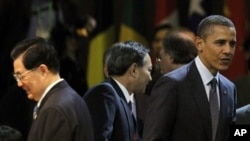Two prominent scholars are warning that long-term "strategic" distrust between the United States and China is becoming more serious despite rapidly expanding contacts between the two countries.
The warning comes in a report this week from Kenneth Lieberthal, the national security director for Asia under former president Bill Clinton, and Wang Jisi, dean of international studies at Beijing University and a member of the Foreign Policy Advisory Committee at China's foreign ministry.
The report, published by the influential Brookings Institution in Washington, asserts the United States and China will remain the world's two most consequential countries over the coming decades, and that their relationship will profoundly affect the entire world.
However, according to the authors, neither country trusts the other's long-term intentions, leading potentially to attitudes and actions that will only deepen that mistrust.
David Kelly, research director at the Beijing-based research firm China Policy, said the report itself is a hopeful development.
“But the very fact that this document could be prepared by two eminent scholars in their countries is not a bad sign," said Kelly. "I don't remember many like it. It’s in some ways a pioneering effort, to do what they call thinking in the others’ shoes, you know, putting yourself in the other person’s shoes. And they try to do it each from their own side. They think their way into the other side to some extent,” he said.
America: a 'declining superpower'
Explaining Chinese attitudes, author Wang Jisi writes Beijing leaders see the United States as a declining superpower whose influence is increasingly challenged by rising powers like India, Brazil, Russia and South Africa, which met last week with China at a summit of the so-called BRICS countries.
China also sees its political model of strong central management of social and economic affairs as a viable alternative to Western democracy and market economies, says Wang. Consequently, Chinese leaders fear the United States will try to constrain or upset China's rise.
Wang believes China sees U.S. efforts to promote democracy and human rights as an attempt to sabotage the ruling Communist Party.
China's 'zero-sum' game
For his part, author Kenneth Lieberthal says U.S. policymakers desire a constructive long-term relationship with China, but see Beijing's future as very undetermined, raising doubts about how best to influence its behavior.
Lieberthal also says Americans believe China sees the relationship as a "zero-sum game" in which one side's gain is the other side's loss. This requires America to prepare to defend its interests in the region and bolster its ties with Asian allies.
He says Americans also believe one-party governing systems like China's are less transparent than democratic governments, and therefore harder to trust.
The side-by-side accounts help to highlight the essentially asymmetrical nature of the U.S.-China relationship, said researcher David Kelly.
“To China, America is all-important. China sees the world in terms of a contest between China and America," he said. "But America is very reluctant to do that, and that is because America faces many other challenges. America has still got a major challenge in the Middle East, and has spent most of the past 10 years dealing with the Middle East.”
Sustained, open dialogue
The report's authors recommend several steps to improve trust between the countries, including a sustained dialogue on military deployments aimed at agreeing on measures that would allow China to defend its core security interests while allowing America to meet its obligations to friends and allies in the region.
On the economic side, they say the United States should encourage Chinese investment in real assets in the U.S. and quickly complete a review of restrictions on technology exports to China. And China should make the detailed workings of its political system more transparent so that U.S. officials can develop more realistic expectations of China.
Wang and Lieberthal also say the two countries should begin negotiations as soon as possible on a bilateral investment treaty.




